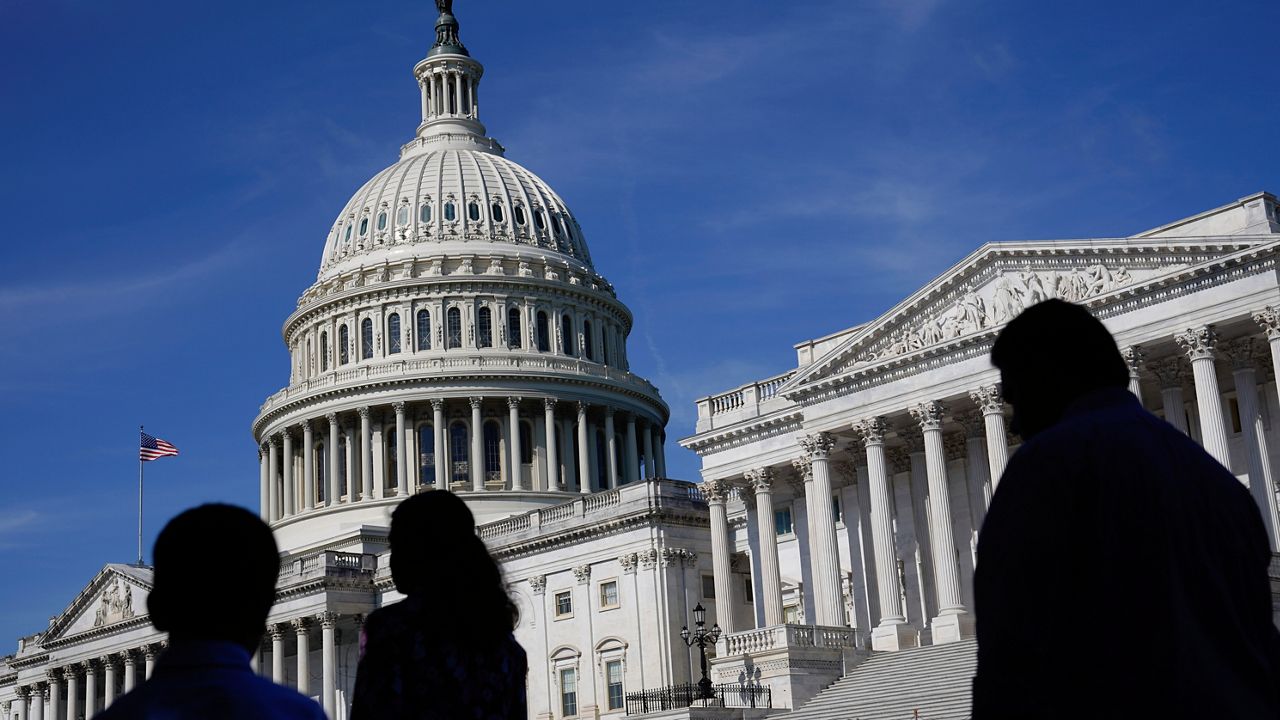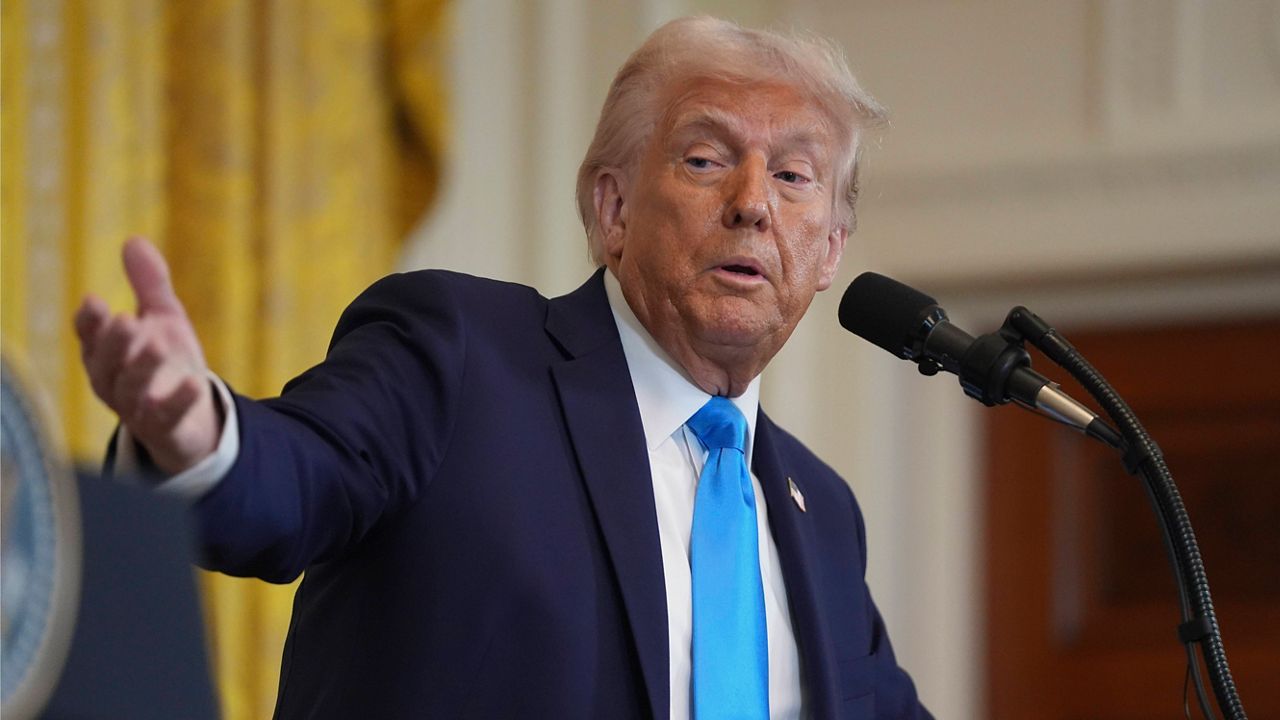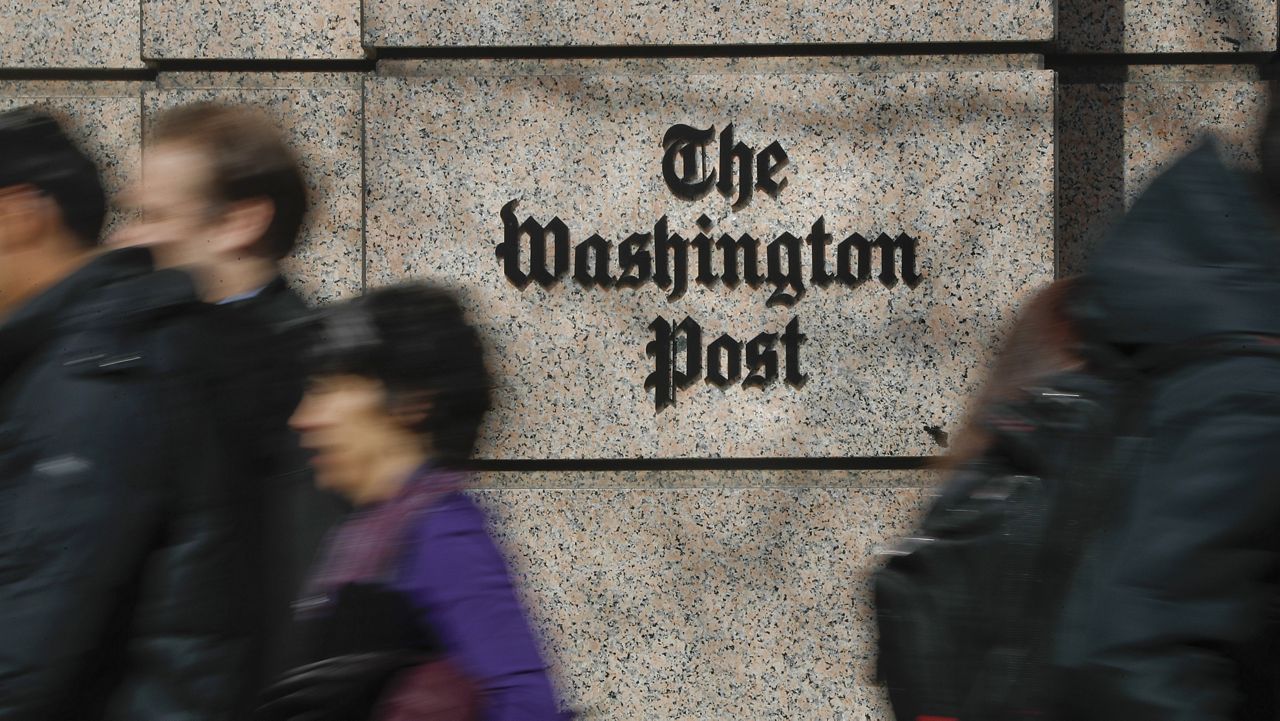The 2022 midterm elections— the first mid-cycle contests of Joe Biden’s presidency — are shaping up to be one for the history books.
According to an analysis from pollster Echelon Insights, an estimated 125.6 million Americans are expected to turn out in November’s midterm contests. Such a figure would shatter the record set in 2018’s midterms, which saw 53.4% of the eligible voting-age population cast their ballots, according to the Census Bureau.
And already voters are starting to come out in full force: As of Sunday, Nov. 6, at least 40 million people have already cast their ballots in the midterms, according to the United States Elections Project.
A pair of polls released Sunday, days before the election, found that the battle for Congress is virtually tied, with one survey showing equal enthusiasm among Democrats and Republicans to cast their votes.
And with the issues at stake in November’s midterms, it’s easy to see why voters on both sides of the aisle are turning out in droves.
Up for grabs in November is control of Congress — the House and Senate are both narrowly controlled by Democrats — as well as several key gubernatorial races across the country, including in key battleground states like Georgia, Pennsylvania and Arizona, which narrowly decided the 2020 presidential election.
There are also a number of key ballot initiatives in states across the country, with referendums on issues from voting rights to recreational marijuana, as well as the right to an abortion. November’s contests feature six ballot measures related to abortion, with these being the first midterm contests since the Supreme Court voted to overturn Roe v. Wade in June.
The battle over abortion rights looks to be a key issue in these elections, with some advocates calling it “Roe-vember” and banking on a surge in voter registration and enthusiasm following the Supreme Court’s ruling in Dobbs v. Jackson Women’s Health, which eliminated the constitutional right to an abortion.
Many voters are also expected to be focused on the economy, with inflation still near a 40-year high and Americans feeling the pain everywhere from the grocery store to the gas pump, though prices of the latter have fallen significantly and largely steadily since hitting an all-time high in June.
Recent polls have shown that both issues are top of mind for Americans heading into the midterms, with economic issues often slightly outpacing abortion in recent surveys.
Here’s a look at what’s at stake in November’s elections:
Currently, both chambers of Congress are under the control of Democrats.
In the House, Democrats hold a narrow 220-212 majority, with three vacancies due to deaths and resignations.
The Senate is deadlocked — a 50-50 split, with Vice President Kamala Harris breaking any ties, giving Democrats the majority.
In a typical year, the midterms are a referendum on the current occupant of the White House, and generally do not leave behind good results for the president’s party, which typically loses an average of 28 House seats and 4 Senate seats in midterms, according to historical trends.
But experts say that might not be the case come November.
According to a forecast from FiveThirtyEight, Republicans have a roughly 75% chance of taking control of the House, though their odds dropped slightly following June’s abortion ruling. The outlet also gives Democrats an approximately 2-in-3 chance to keep the Senate, with the possibility of the president’s party even adding to their majority in the upper chamber.
In addition to the abortion ruling, experts predict Democrats’ chances may have improved thanks also to lower gas prices and a string of legislative victories for President Joe Biden and congressional Democrats — including the sweeping climate change, health care and tax reform bill known as the Inflation Reduction Act passed by Democrats alone, and the CHIPS and Science Act, a bill aimed at boosting semiconductor research that has spurred a string of recent investments from major technology companies.
"I think the president's party is going to lose seats in the House," David Barker, Director of the Center for Congressional and Presidential Studies at American University, told Spectrum News last month. "I would be extremely shocked if they didn't lose seats. But four months ago, it looked like they might lose 40 seats. Right now, it looks like they might lose 10 to 15.”
"Things were looking really, really bad for the Democrats," he added. "And then since June, we've seen this this turnaround in terms of registration, in terms of polling, in terms of fundraising.”
But some experts warn that voter registration does not always equate to turnout. Kyle Kondik, managing editor of Sabato’s Crystal Ball at the University of Virginia Center for Politics, says Republicans could still walk away from the November election with control of Congress.
“Usually what the public will sort of negatively react to and have a referendum on in the midterm is something that the president's party does that they don't like,” Kondik told Spectrum News. “In this instance, it was an unpopular decision rendered by a Supreme Court that's controlled by the party that doesn't control the presidency and Congress.”
“Given the tiny majorities Democrats have [in] both [the] House and Senate … Republicans could have both chambers, just like they hope to have,” he added.
All 435 seats in the House of Representatives and a third of the U.S. Senate is up for grabs in November.
With control of Congress hanging in the balance, all eyes are on races in a few key states.
In the Senate:
- Georgia: Sen. Raphael Warnock, a Democrat who won a closely watched special election in Jan. 2021, is facing off against former football star and Republican Herschel Walker for a full term in the Senate
- Pennsylvania: Celebrity physician Dr. Oz is up against Democratic Lt. Gov. John Fetterman to replace retiring GOP Sen. Pat Toomey
- Ohio: Democratic Rep. Tim Ryan is squaring off against “Hillbilly Elegy” author J.D. Vance to replace Republican Sen. Rob Portman, who is retiring
- North Carolina: Trump-backed Rep. Ted Budd is facing Democrat Cheri Beasley, former chief justice of the North Carolina Supreme Court, to replace retiring GOP Sen. Richard Burr
- Wisconsin: Incumbent GOP Sen. Ron Johnson is on the ticket against Lt. Gov. Mandela Barnes
- Nevada: Incumbent Sen. Catherine Cortez Masto is squaring off against Republican challenger Adam Laxalt, who previously served as the state’s attorney general
- Arizona: Incumbent Democrat Sen. Mark Kelly faces Trump-endorsed venture capitalist Blake Masters
- New Hampshire: Sen. Maggie Hassan, a Democrat, is up against Retired Army Brig. Gen. Don Bolduc, a Republican
With the exception of Ohio and North Carolina, all of those states were won by President Biden in 2020 — including Wisconsin, Pennsylvania and Arizona, which Trump won in 2016 but lost four years later.
Polling in many of these races have tightened in recent weeks, and both parties see opportunities for pickups to try and flip the Senate's 50-50 deadlock. It's unclear how recent controversies surrounding Walker, the GOP's candidate in Georgia, and questions about Democrat Fetterman's health in Pennsylvania will impact both races.
Thanks to the redistricting process, which took place over the course of the last year following the results of the 2020 Census, the makeup of the House of Representatives may look a little different. The new Congressional map largely preserves a slight Republican advantage, thanks in part to new maps in Florida and Texas. Though Democrats gained more seats that lean toward them, according to an analysis from FiveThirtyEight, court decisions striking down much friendlier maps in New York and Maryland put them at a disadvantage going into November's midterms.
A FiveThirtyEight analysis also points out that there are fewer competitive districts in the new Congressional map.
Surprisingly, some experts and lawmakers predict that the House majority may be decided just within the reliably blue states of New York and California, with possible pickup opportunities for members of both parties.
In New York, nine out of the state's 26 Congressional seats are seen as competitive, according to the nonpartisan Cook Political Report, including key races in the Hudson Valley and on Long Island.
New York has more compteitive races of any state other than California. Per Cook, the Golden State has 10 competitive races: One listed as "likely Democratic," two listed as "likely Republican," four that lean toward either party, split evenly, and three listed as "toss-up" races.
But a crucial special election win over the summer may give New York Democrats some hope: In August, Democrat Pat Ryan won a special election in New York's 19th Congressional District over former GOP gubernatorial candidate Marc Molinaro, a swing district that went for Barack Obama in 2012, Trump in 2016 and Biden in 2020.
Ryan campaigned as a vociferous defender of abortion rights, while Molinaro stumped on the economy and crime. Polls never showed Ryan leading, including one released the day of the election which showed Molinaro up by 8 points.
Ryan is running again in the newly redrawn 18th district against Republican Colin Schmitt, while Molinaro is running in the 19th against Democrat Josh Riley. A recent Spectrum News-Siena College poll shows Riley leading Molinaro, while Cook recently listed the Ryan-Schmitt race as "Leans Democratic."
In California, Republicans are hoping to compete in Orange County, a historically GOP-leaning region that has recently shifted more to the left, and the Central Valley, an area known for its agriculture, though they'll have to overcome a major registration disadvantage. Democrats, on the other hand, are looking to win back four seats they lost in 2020 and shore up their margins statewide.
Leaders of both parties in the House are bullish on their chances in November.
"I’ll be frank with you: August was not a good month for us," House Minority Leader Kevin McCarthy, R-Calif., told Punchbowl News, acknowledging the impact of the abortion ruling and falling gas prices. But the Republican leader believes the momentum has shifted, with voters more focused on the economy, crime and education.
“Any Democratic incumbent that’s sitting at 46 [percent] or less, they’re going to have a really hard time winning," McCarthy told the outlet. "I think they’re in denial.”
"We fully intend to hold the House," House Speaker Nancy Pelosi, D-Calif., told reporters in September. "Even though there are some among you who belittle my political instincts and the rest, I got us here twice to the majority, and I don't intend to give it up."
Amid the COVID-19 pandemic, in the aftermath of the Roe v. Wade decision and with false claims about election fraud in the 2020 election a major issue in some campaigns, the importance of gubernatorial races is in full focus in November's midterms.
All told, 36 states will pick their governor in November, including:
- Michigan: Incumbent Gov. Gretchen Whitmer is facing a challenge from Republican Tudor Dixon, a conservative political commentator
- Arizona: Secretary of State Katie Hobbs, a Democrat, is locked in a tough battle against Republican Kari Lake, a former television news anchor
- Pennsylvania: Doug Mastriano, a former GOP state senator, is taking on Democratic state attorney general Josh Shapiro
- Nevada: Incumbent Gov. Steve Sisolak, a Democrat, faces off against Clark County Sheriff Joe Lombardo, a Republican
- Wisconsin: Incumbent Gov. Tony Evers is being challenged by Republican businessman Tim Michels
- Georgia: A rematch of 2018's gubernatorial race pits incumbent Gov. Brian Kemp against Democratic voting rights activist Stacey Abrams
- Kansas: Months after voters in the state overwhelmingly rejected a Republican-backed abortion referendum, incumbent Gov. Laura Kelly, a Democrat, looks to hold off GOP challenger Derek Schmidt
Several other prominent races featuring high-profile candidates might not look to be as competitive: In New York, incumbent Gov. Kathy Hochul, a Democrat, leads Republican Rep. Lee Zeldin in most polls. In GOP strongholds Texas and Florida, despite challenges from prominent Democrats Beto O'Rourke and Charlie Crist, Govs. Greg Abbott and Ron DeSantis appear well-positioned to stay in power.
Some statehouses are expected to flip for the first time in several years, like Massachusetts and Maryland, which are favored to swing toward Democrats after being held by popular moderate Republicans.
Republicans, meanwhile, are hoping to flip close states like Nevada and Wisconsin – and even a reliably blue state like Oregon, where a moderate Democrat running as an independent candidate could split the vote.
In recent years – largely in the wake of the 2020 presidential election – the secretary of state role has taken on greater importance. The role is also the chief election officer in 40 states, giving them oversight of the state's election results.
Perhaps the most well-known is Brad Raffensperger, who famously resisted Trump’s call for him to “find enough votes” to reverse his loss in Georgia, which Biden ultimately won by just under 12,000 votes.
Raffensperger's actions earned him a book deal, bipartisan praise and a the opportuinty to testify at both a high-profile Jan. 6 panel hearing and before a Georgia grand jury investigating possible illegal interference in the state's 2020 election. It has also earned Raffensperger the ire of the former president, who launched insults at the state official, going so far as to accuse his brother of being an operative for China. (Raffensperger does not have a brother.)
Still, Raffensperger in May easily won the Republican primary for re-election in Georgia, beating out Trump-backed candidate Rep. Jody Hice, who was critical of how the secretary of state handled the 2020 election.
“People should have confidence in the system,” Raffensperger told Spectrum News, saying his guidance stretches for states “across the country.”
But he is largely an outlier in how much faith he has in the 2020 election. In three swing states, three candidates for secretary of state are running on falsehoods about 2020. All are backed by Trump.
One is Arizona’s Mark Finchem, who spoke to constituents the day before the riot at the Capitol on Jan. 6, saying: “When you steal something, that’s not really a win. That’s a fraud.”
Finchem has doubled down on those statements during his campaign for secretary of state – and now, more than 18 months later, says Joe Biden’s win in Arizona should be decertified.
In Michigan, secretary of state candidate Kristina Karamo has Trump’s endorsement pinned atop her Twitter feed, in which the former president said Karamo is strong on the “massive crime of election fraud,” encouraging readers to look at alleged fake election results in Detroit. That claim has been repeatedly disproven, and post-election audits found Biden won Michigan by over 154,000 votes.
Then, there’s Nevada’s Jim Marchant, who said in August that: “The 2020 election was a totally rigged election."
"Whenever I speak, I ask everybody in the audience, I says, “Is there anybody here that really believes Joe Biden was legitimately elected?” And everywhere I go, not one hand goes up,” Marchant continued. “Nobody believes that he was legitimately elected.”
In all three states, Trump’s lies about the election have been repeatedly disproven. There is no evidence of widespread voter fraud in the 2020 presidential election, a claim backed up by officials in Trump's government. Cases brought by the former president and his allies were rejected from courts nationwide, including the Supreme Court.
But those races, and several others across the country, could have implications on future elections. In refusing to shoot down Trump’s erroneous claims, some experts say those secretaries of state could sow further doubt into election integrity.
“It could pose problems even if they don't do anything actively, if they just refuse to do something, that that could be potentially a stick in the spokes of the wheel,” PolitFact’s Louis Jacobson told Spectrum News.
And there are a number of scenarios that could play out should those candidates who continue to deny the results of the 2020 race win their own elections.
“There is a lot of mischief they could do,” said David Becker, who runs the Center for Election Innovation & Research, a non-partisan, non-profit focusing on fair elections. “We're in a really dangerous position right now as a democracy.”
“It's very, very hard for a corrupt secretary of state to install the loser of an election as the winner, because we have transparent processes, because we have courts that will review these things,” Becker continued. “But they could certainly create chaos and confusion in an election that could ultimately lead to things like political violence.”
Spectrum News' Austin Landis, Cassie Semyon, Rachel Tillman, Ryan Chatelain, David Mendez and Chief National Political Reporter Josh Robin contributed to this report.









